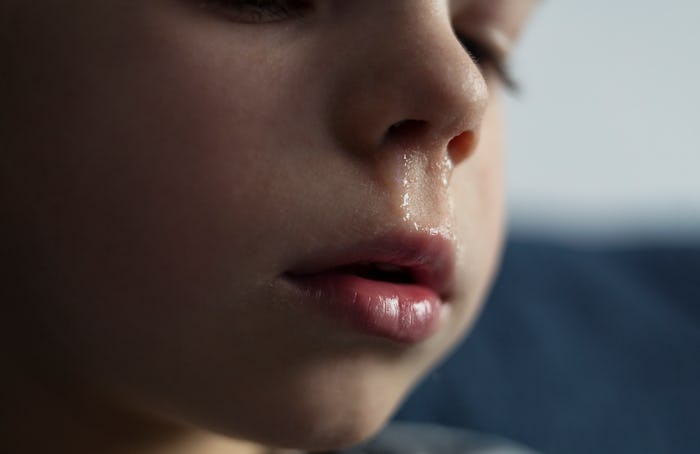What happens when little Harrison misses a day of glueing feathers onto hand turkeys because he's home sick? He loses his perfect attendance award, thanks to the trickle down of hustle culture to little kids who are, in some cases, literally smaller than their own backpacks.
Schools are incentivizing attendance on account of their impact on school rankings and funding, which is great, except our kids aren't running the Reserve Bank of America. They're kids. In charge of nothing more urgent than the Cozy Corner. And as cold and flu season kicks into full gear, more and more kids will need to call out sick. But, as they do, some among them may worry about losing that gold star for attendance.
Among those opposed to this pointless contest ("Least Runny Noses 2019"), Twitter user @thalestral urges us to reconsider this mentality, writing that rewarding "perfect attendance" is ableist and lacks any correlation to positive academic outcomes, to which I say: YES. And, honestly, that's just part of the problem.
But let's start there. In the now viral tweet, @thalestral says:
"Rewarding perfect attendance at any stage of education is inherently ableist and has no correlation to academic success or good mental health. Stop rewarding kids for not being sick, for being sick and forced to go to school, for never being allowed a mental health day."
They go on:
"You'd think burnout wasn't a major negative force on the economy with the way children are conditioned to never value their own health above contributing to a system that isn't tailored to their needs. F*ck all the way off with that nonsense."
It's a tough point to argue, even if you wanted to. According to data from the American Academy of Pediatrics (AAP), ten to 20 million children and adolescents in the United States have some form of chronic illness or disability. In other words, these are conditions that often necessitate time out of school due to illness, as well as medical appointments to monitor and treat that illness. So, before the school year even starts, chronically sick kids understand that they're already out of the running.
Vilifying illness by fetishizing wellness (or, rather, supposed wellness) is reason enough to give up this misguided award, but it's not the only reason.
Per the AAP, children get a lot of colds — between five and eight viruses a year once they reach school age. And while some colds are mild and require little more than sending a kid to school with extra tissues, some can be more debilitating. And do you know what else both the AAP and the CDC say about colds like that? Keep. Your. Kid. Home!
'Perfect attendance' shouldn't be defined as 'not missing a single day of school.'
Governing medical bodies aside, basic germ theory tells us that sick people make other people sick. So it's ridiculous to encourage kids to muscle through a school day while ill (and, most likely, at diminished mental capacity), infecting their friends, teachers, and other staff members by dangling a reward for going to school despite illness over their heads. Now, obviously, there are challenges that come along with keeping a kid home from school — paid sick leave in the United States is often lacking. But if you do have the possibility of keeping your child home, please, do so: for the sake of other kids and those parents who may not have sick leave.
But let's say, for the sake of argument here, a kid is miraculously never even a little bit sick. They have the immune system of a Greek god and remain healthy throughout the year. Isn't that reward enough? Like... not having to deal with a fever or throwing up or diarrhea or a cough for a full 180 days? Rewarding kids with a perfect attendance certificate for that is like giving someone a prize for winning the lottery. Winning the lottery should suffice!
Look, of course it's important to take school — and attendance — seriously. But sometimes, the benefit of attending school cannot compare to the benefit of staying home and resting because you're ill. In other words, "perfect attendance" shouldn't be defined as "not missing a single day of school." Perfection should refer to a balance of attendance and veging on the couch that best supports your kid's health, well-being, and education as a whole.
No piece of paper on the last day of school can compare to that.
